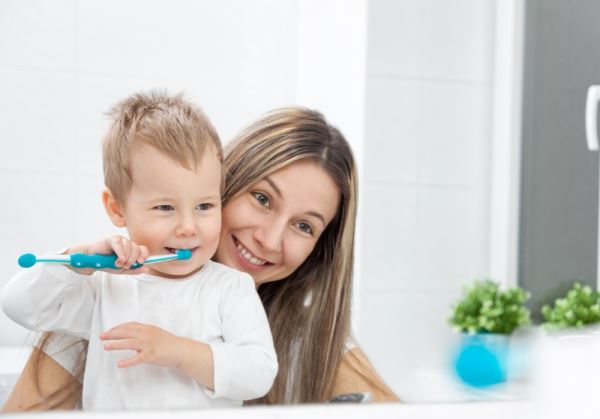Our Blog
Maintaining oral hygiene from birth is key to preventing cavities and promoting a healthy mouth in adulthood.
Many of the oral conditions that occur in adulthood could have been avoided with proper prevention in the early years. According to the Sanitas Oral Health Study in 2025, the main oral problem for Spaniards in the last year was cavities. 40.7% of those surveyed reported having cavities during 2024, and 37.7% admitted to having suffered from tooth sensitivity. Given this situation, Sanitas Dental experts remind us that starting to clean a baby's gums from birth helps prevent infections, prevent early cavities, and promote long-term healthy habits.
“Oral health doesn’t start with your teeth, but with your routines,” says Lorena Trinidad Bueno, from the Healthcare, Innovation and Clinical Quality team at Sanitas Dental, who emphasizes that “prevention is the best tool for ensuring a healthy mouth, since the earlier it starts, the better the long-term results will be.”
In this context, Dr. José Jiménez Martínez, head of the Pediatrics and Neonatology department at Sanitas La Moraleja University Hospital, emphasizes that “incorporating oral hygiene into daily routines from birth is an investment in health that lasts a lifetime.” To this end, he establishes a series of recommendations adapted to each stage of child development.
- During the first few months of life, you can clean your baby's gums once a day with a damp gauze pad or silicone finger cot, especially before bedtime. This simple practice prevents the buildup of bacteria and milk residue.
- With the eruption of the first tooth, which usually occurs between 6 and 12 months, twice-daily brushing with a soft-bristled child's toothbrush and a minimal amount of fluoride toothpaste (the size of a grain of rice, equivalent to 1,000 ppm of fluoride for children under 3 years of age) should be incorporated.
- The first visit should take place when the first tooth erupts or, at the latest, by the first birthday. This early check-up allows for the detection of possible alterations, correction of habits such as prolonged use of a pacifier or bottle at night, and resolution of feeding-related concerns. Sanitas Dental experts have compiled a list to identify some of the common mistakes parents and caregivers make that can negatively affect their baby's oral health:
- Delaying oral hygiene until teeth appear. Bacteria can accumulate on the gums from the first few days.
- Dipping the pacifier in sugar or honey. This practice increases the risk of early childhood cavities and is unhealthy for the baby.
- Applying too much toothpaste. For babies, the amount should be minimal to avoid excessive fluoride intake.
- Allow your baby to fall asleep with a bottle, as sugary liquids stay in the mouth for hours and can cause cavities.
- Skip your first dental checkup. This appointment is key to establishing good habits and detecting potential problems early.
“Establishing an oral hygiene routine from the first days of life, following clinical guidelines and avoiding common mistakes, helps prevent pathologies and develop lasting habits. Simple actions such as daily gum cleaning and regular checkups are essential to ensuring optimal oral health throughout life,” concludes Lorena Trinidad.

